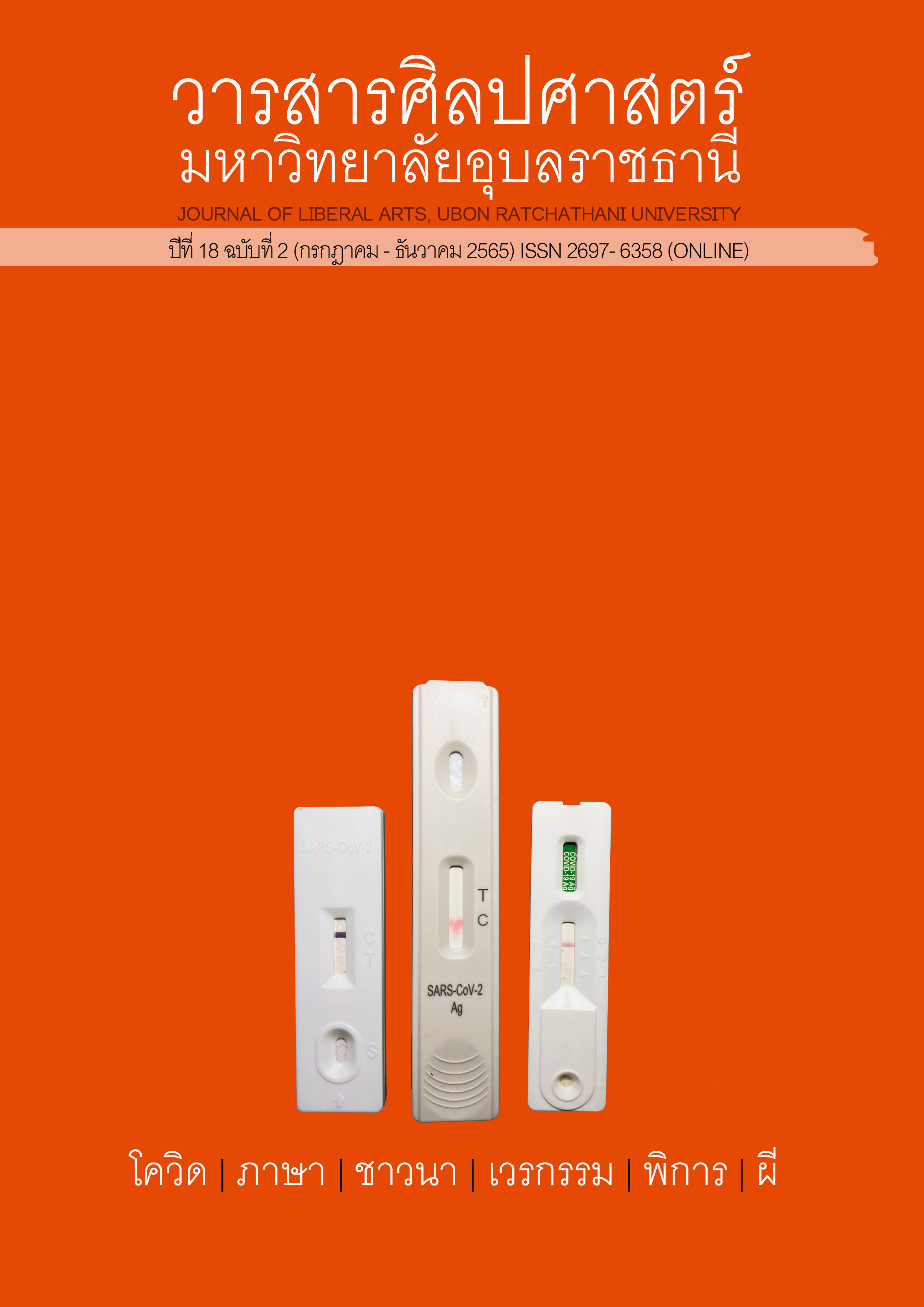ความเชื่อเรื่องกรรม วาทศิลป์ของเวทนา และการเมืองแห่งความสงสารต่อคนพิการในสังคมไทย
Main Article Content
บทคัดย่อ
บทความชิ้นนี้วิพากษ์การผสมรวมกันระหว่างความหมายทางวัฒนธรรมที่เกี่ยวข้องกับความพิการในสังคมไทย โดยเฉพาะอิทธิพลเรื่องกรรมและวาทศิลป์ของเวทนา หรือความรู้สึกสงสารจากความเชื่อพุทธเถรวาทในฐานะส่วนหนึ่งของศีลธรรมเชิงสถาบัน กับอำนาจชีวการเมืองที่ถูกสร้างจากนโยบายของรัฐบาลไทย และอุดมการณ์ทางการเมืองในระดับโลกแนวคิดสิทธิมนุษยชนที่เป็นผลผลิตจากองค์กรนานาชาติ ที่ได้สร้างการเมืองของความสงสารต่อคนพิการ ซึ่งกรอบคิดทางการเมืองนี้ใช้ประเมินความเป็นมนุษย์และหยิบยื่นคุณค่าและความหมายของชีวิตให้กับคนพิการในสังคมไทย ภายใต้การเมืองของความสงสาร คนพิการถูกปฏิบัติในฐานะองค์ประธานทางการเมืองและถูกทำให้กลายเป็นปัญหาทางศีลธรรม พร้อมกับมีมุมมองต่อคนพิการในฐานะบุคคลต้องได้รับการสงเคราะห์ทางสังคม อีกทั้งคนพิการควรที่จะต้องถูกควบคุมไว้ที่สถานสงเคราะห์คนพิการในนามมนุษยธรรมและคนพิการเป็นบุคคลที่น่าสงสารควรที่จะต้องถูกจำกัดพื้นที่ไว้ที่บ้าน ไม่ให้ออกมาใช้ชีวิตข้างนอกด้วยความคิดเรื่องเวทนาคนพิการ บทความจะชี้ให้เห็นว่าการเคลื่อนไหวทางสังคมการเมืองในประเด็นที่เกี่ยวข้องกับคนพิการในสังคมไทยเพื่อท้าทายการเมืองของความสงสารต่อคนพิการ ซึ่งได้สร้างการกีดกันทางสังคมให้กับคนพิการ ภายใต้กรอบคิดการเมืองของอัตลักษณ์ แบบจำลองทางสังคมของความพิการ และแนวคิดสิทธิมนุษยชน การเคลื่อนไหวทางสังคมการเมืองภายใต้กรอบคิดดังกล่าวเพื่อนิยามใหม่สถานะความเป็นพลเมืองของคนพิการและสิทธิทางสังคม รวมทั้งนิยามใหม่ความหมายทางสังคมเกี่ยวกับคนพิการที่ถูกขับเคลื่อนจากความเชื่อพุทธเถรวาท โดยเฉพาะแนวคิดเรื่องกรรมและวาทศิลป์ของเวทนา บทความวิจารณ์ว่าการเคลื่อนไหวดังกล่าวดูเหมือนจะประสบความสำเร็จในการช่วยนิยามใหม่คนพิการที่ถูกตราไว้ในกฎหมาย แต่ความพยายามผ่านการเคลื่อนไหวดังกล่าวย้อนแย้งในตัวเอง กล่าวคือในท้ายสุด มันสนับสนุนการผลิตซ้ำระบบการกีดกันคนพิการผ่านกรอบคิดการเคลื่อนไหวต่อสู้ ที่ยังคงตั้งอยู่บนพื้นฐานระบอบคิดหลักการมองร่างกายที่สมบูรณ์แบบคือร่างกายที่ต้องมีสมรรถภาพ
Downloads
Article Details

อนุญาตภายใต้เงื่อนไข Creative Commons Attribution-NonCommercial-NoDerivatives 4.0 International License.
เอกสารอ้างอิง
Bickenbach, J. et al. (1999). Models of Disablement, Universalism and the ICIDH. Social Science and Medicine, 48 (9), 1173-1187.
Boontan, M. (2000). Philosophy and Administrative Principle. [in Thai]. In Association for the Blind People in Thailand. Three Decades of Association for the Blind People in Thailand. Bangkok: Jirarat Print.
Bualar, T. (2010). Disability Rehabilitation Policy in Thailand: Explaining why it has come under fire. Journal of Asian Public Policy, 3 (1), 111-117.
Corker, M. (1999). Differences, Conflations and Foundations: The Limits to Accurate”, Theoretical Representation of Disabled People's Experience? Disability and Society, 14 (5), 627-642.
Csordas, T. (1990). Embodiment as a Paradigm for Anthropology. Ethos, 18 (1), 5-47.
Csordas, T. (1993). Somatic Modes of Attention. Cultural Anthropology, 8 (2), 135-156.
Csordas, T. (Ed.). (1994). Embodiment and Experience: The Existential Ground of Culture and Self. Cambridge: Cambridge University
Press.
Desjarlais, R. (1992). Body and Emotion: The Aesthetics of Illness and Healing in the Nepal Himalayas. Philadelphia: University of Pennsylvania. Press.
Hiranyatheb, T. (2008). Disability Discourse in Modern Thai Narratives. [in Thai]. (Unpublished doctoral dissertation). Chulalongkorn University, Bangkok.
Hughes, B. & Paterson, K. (1997). The Social Model of Disability and the Disappearing Body: Towards a Sociology of Impairment. Disability and Society, 12 (3), 325-340.
Kata, P. (2014). The Biopolitics and Impaired Body: The History of Ambiguous Citizen in Thailand. [in Thai]. Nonthaburi: Society and Health Institute.
Kata, P. (2016). En Thaïlande, des citoyens ambigus. In Gardou, C., editor. Le handicap et ses empreintes culturelles. Variations anthropologiques, 3, 197-208.
Kata, P. (2017). The Birth of Disabled People as ‘Ambiguous Citizens’: Bio-politics, the Ethical Regime of the Impaired Body, and the Ironies of Identity Politics in Thailand. In Hardon, A. & Hadolt, B., editors. New Socialities and Subjectivities in 21st Century Health Care. (p. 61-74). Amsterdam: Amsterdam University Press.
King, J. & King, M. (2011). The Lived Experience of Families Living with Spinal Cord Disability in Northeast Thailand. Third World Quarterly, 32 (8), 1475-1491.
McRuer, R. (2006). Crip Theory: Cultural Signs of Queerness and Disability. New York and London: New York University Press.
Naemiratch, B. & Manderson, L. (2009). Pity and Pragmatism: Understandings of Disability in Northeast Thailand. Disability and Society, 24 (4), 479-480.
Payutto, P. (1995). Dictionary of Buddhism. [in Thai]. Bangkok: Mahachulalongkorn University Press.
Persons with Disabilities Empowerment Act. (2007). Royal Thai Government Gazette. [in Thai]. 124, section 61 A, 8-24.
Petkong, W. (2005). The Civic Network of Disabled People: Identity Construction in Health System Reform Movement. [in Thai]. Nonthaburi: Society and Health Institute.
Ratanakul, P. (1988). Bioethics in Thailand: the Struggle for Buddhist Solutions. The Journal of Medicine and Philosophy, 13 (3),
-312.
Ratanakul, P. (1996). The Buddhist Concept of Health and Disease. In Ratanakul. P. & Than, K., editors. Health, Healing and Religion: An Inter-Religious Dialogue. (p. 31-40). Bangkok: The Center of Human Resources Development, Mahidol University.
Rehabilitation for Persons with Disabilities Act. (1991). Royal Thai Government Gazette (Special Volume), [in Thai]. No.108, section 205, 18-28.
Reinders, H. (2008). Receiving the Gift of Friendship: Profound Disability, Theological Anthropology, and Ethics. Michigan: Wm. B. Eerdmans Publishing.
Riewpaiboon, W. & Blume, S. (2009). Disability and Rehabilitation in Europe, North America and Asia. In Addlakhu. R., Blume, S., Devlieger, P., Nagase, O. & Miriam. W., editors. Disability and Society: A Reader. (xvii-xx) New Delhi: Orient BlackSwan.
Rukwong, P., Chirawatkul, S. & Markovic, M. (2007). Suk-Sam-Bai: The Quality of Life Perceptions among Middle-Aged Women Living with a Disability in Isaan, Thailand. Journal of Nursing Research, 15 (4), 285-295.
Rukwong, P. (2008). Lived Experience of Middle-Aged Women Living with a Disability in Isaan, Thailand. Nursing and Health Science, 10, 59-64.
Schumm, D. & Stoltzfus, M. (2007). Chronic Illness and Disability: Narratives of Suffering and Healing in Buddhism and Christianity. Journal of Religion, Disability and Health, 11 (3), 5 – 21.
Scully, J. L. (2014). Disability and Vulnerability: On Bodies, Dependence, and Power. In Mackenzie. C., Rogers, W. & Dodds, S., editors. Vulnerability: New Essays in Ethics and Feminist Philosophy. (p. 204-221). New York: Oxford University Press.
Sherer, P. (2009). Sexuality and Reproductive Health of Women with Disabilities. [in Thai]. Proceeding of the First National Conference on Sexuality Studies in Thailand. (p. 12-21). 7-8 January 2008, Ratanakosin Hotel, Bangkok.
The Constitution of the Kingdom of Thailand. (2007). Royal Thai Government Gazette. [in Thai]. section 30A.
The Institute of Health Promotion for People with Disability. (2007). The Politics of Persons with Disabilities Newsletter, [in Thai]. 4, 8.
The Institute of Health Promotion for People with Disability. (2008). The Politics of Persons with Disabilities Newsletter, [in Thai]. 13,
-37.
The Institute of Health Promotion for People with Disability. (2009). The Politics of Persons with Disabilities Newsletter, [in Thai]. 14,
-49.
The Institute of Health Promotion for People with Disability. (2010). The Politics of Persons with Disabilities Newsletter, [in Thai]. 18, 9.
Thomas, C. (1999). Female Forms: Experiencing and Understanding Disability. Buckingham: Open University Press.
Tongprasert, J. (1985). Thai Language. [in Thai]. Bangkok: Praepittaya Press.
Tremain, S. (2001). On the Government of Disability. Social Theory and Practice, 27 (4), 617-636.
Tremain, S. (2002). On the Subject of Impairment. In Corker, M. & Shakespeare, T., editor. Disability/Postmodernity: Embodying Political Theory. (p. 32-47). London: Continuum Press.
Vajanasara, K. (2005). Social Representation of Disabled People in Thailand: A Case Study of Thai Literature. [in Thai]. Nonthaburi: The Health Promotion for People with Disability in Thailand Program, Health System Research Institute, Thai Health Promotion Foundation, Sirindhorn National Medical Rehabilitation Centre.


